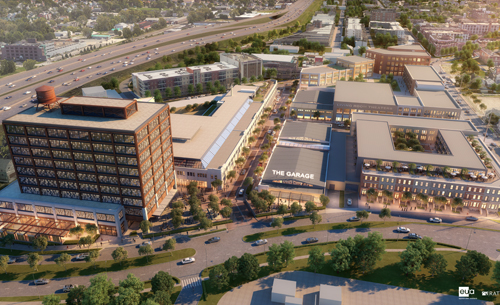Subscriber Benefit
As a subscriber you can listen to articles at work, in the car, or while you work out. Subscribe NowThe city of Indianapolis is prepared to commit up to $4.6 million to the downtown Bottleworks project, with most of the amount needed to move an electric transmission line running through the site.
A 38-page project agreement between the city and developer Hendricks Commercial Properties, set to be approved Wednesday by the Metropolitan Development Commission, outlines city costs associated with the project, along with other details.
Beloit, Wisconsin-based Hendricks in July won approval from the Indianapolis Historic Preservation Commission to build the $260 million project on the 11-acre site of the former Coca-Cola bottling plant.
Construction on the property at North College and Massachusetts avenues is expected to begin early next year. Plans call for a 136-room West Elm hotel, an eight-screen cinema, office and retail space, and apartments and condominiums.
To help prime construction, the city has agreed to pay Indianapolis Power & Light up to $4 million to move an overhead transmission line that runs through the property and extends north to a substation at the northeast corner of College and East 10th Street. The line will be moved so that it runs along College Avenue on 100-foot metal poles, said Isaac Bamgbose, Hendricks’ vice president of asset management.
Burying the line below ground instead of moving it would could cost up to $20 million, he said, so planners opted to move it instead.
The city hopes the cost to move the transmission line will end up costing less than $4 million. But it’s prepared to spend that much, by dipping into public infrastructure dollars available from downtown tax-increment financing district funds, said Thomas Cook, Mayor Joe Hogsett’s chief of staff.
In addition, the city will provide $600,000 to help with environmental remediation costs.
“We’re proud that this is going to move the project forward without necessitating any new debt,” Cook said.
The $600,000 acts much like a “premium” to activate insurance policies that should cover estimated offsite remediation costs of $4.1 million.
“The city thought it was important to provide a guarantee to the neighborhood,” Cook said. “So, what we’ve done is, we’ll provide this upfront assistance to ensure these polices will be triggered. In the event insurance proceeds are inefficient to cover the off-site costs, the city will be a backstop for those expenses.”
In February, Hendricks told IBJ that contamination on the former Coca-Cola bottling plant site is more widespread than it initially expected and has seeped into the adjacent Chatham Arch neighborhood.
The developer anticipated that the site would need environmental remediation following decades of manufacturing operations and, in its bid to purchase the property, requested $2.4 million from the state to cover cleanup costs.
But Hendricks says it will need more money to tackle the plume of contamination that has made its way into the surrounding groundwater.
“The city is stepping up to the plate to help take care of the neighborhood as it relates to this development and project,” Bamgbose said.
Hendricks’ proposal to redevelop the site beat out five other bids—two from Milhaus Inc. and one each from Browning Investments LLC, Strategic Capital Partners LLC and Hageman Group. They sought city incentives ranging from $6.5 million to $28.6 million.
Other requirements of the project agreement state that Hendricks must complete $100 million of development, or the first phase of the project, by Dec. 31, 2019. The initial phase includes preparation and development of the historic administration building (the West Elm hotel) and three garages for restaurant and retail space.
In sum, Hendricks’ proposal for the Bottleworks development calls for 157 apartment units, 40 for-sale condominiums, 170,000 square feet of office space and 114,000 square feet of retail space, for a total 1.2 million square feet of development.
The developer is applying for federal historic tax credits to help save “95 percent” of the structures, Bamgbose said. It’s finishing construction documents and plans to apply for the tax credits soon. That’s a 120-day process, pushing the start of construction until early next year, he said.
After the project agreement is approved by MDC, likely on Wednesday, Hendricks is set to close in September with Indianapolis Public Schools on the sale of the property, Bamgbose said. Hendricks has agreed to pay IPS $12 million for the property.
IPS owns the site and used it to house the school system’s bus-maintenance operations in the historic bottling plant.
Per the project agreement, Hendricks has agreed to spend 15 percent of design and construction costs with minority-owned businesses; 8 percent with women-owned businesses, 3 percent with veteran-owned businesses and 1 percent with disabled business owners. It also has agreed to include LGBT-owned businesses in the design and construction process.
The architects on the project are Milwaukee, Wisconsin-based Eppstein Uhen Architects and locally-based Ratio Architects.
On a related note, the city will study the feasibility of converting College Avenue from a one-way to two-way street from Massachusetts Avenue south to Michigan Street. The study should be done in October, with a transition to a two-way street finishing within five years of the completion of the study.
“That was something we really pushed the city on as we were talking to the neighborhood,” Bamgbose said.
Please enable JavaScript to view this content.

